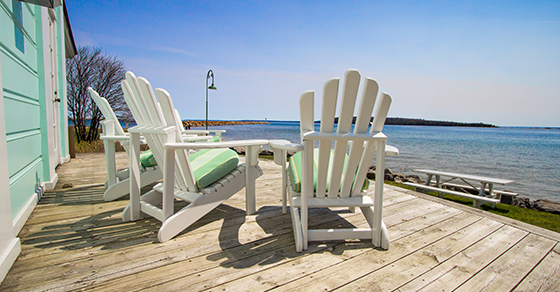If you’re fortunate enough to own a vacation home, you may want to rent it out for part of the year. What are the tax consequences?
The tax treatment can be complex. It depends on how many days it’s rented and your level of personal use. Personal use includes vacation use by you, your relatives (even if you charge them market rent) and use by nonrelatives if a market rent isn’t charged.
Less than 15 days
If you rent the property out for less than 15 days during the year, it’s not treated as “rental property” at all. In the right circumstances, this can produce revenue and significant tax benefits. Any rent you receive isn’t included in your income for tax purposes. On the other hand, you can only deduct property taxes and mortgage interest — no other operating costs or depreciation. (Mortgage interest is deductible on your principal residence and one other home, subject to certain limits.)
If you rent the property out for more than 14 days, you must include the rent received in income. However, you can deduct part of your operating expenses and depreciation, subject to certain rules. First, you must allocate your expenses between the personal use days and the rental days. For example, if the house is rented for 90 days and used personally for 30 days, 75% of the use is rental (90 out of 120 total use days). You’d allocate 75% of your costs such as maintenance, utilities and insurance to rental. You’d also allocate 75% of your depreciation allowance, interest and taxes for the property to rental. The personal use portion of taxes is separately deductible. The personal use part of interest on a second home is also deductible (if eligible) where the personal use exceeds the greater of 14 days or 10% of the rental days. However, depreciation on the personal use portion isn’t allowed.
Claiming a loss
If the rental income exceeds these allocable deductions, you report the rent and deductions to determine the amount of rental income to add to your other income. If the expenses exceed the income, you may be able to claim a rental loss. This depends on how many days you use the house for personal purposes.
Here’s the test: if you use it personally for more than the greater of a) 14 days, or b) 10% of the rental days, you’re using it “too much” and can’t claim your loss. In this case, you can still use your deductions to wipe out rental income, but you can’t create a loss. Deductions you can’t use are carried forward and may be usable in future years. If you’re limited to using deductions only up to the rental income amount, you must use the deductions allocated to the rental portion in this order: 1) interest and taxes, 2) operating costs and 3) depreciation.
If you “pass” the personal use test, you must still allocate your expenses between the personal and rental portions. In this case, however, if your rental deductions exceed rental income, you can claim the loss. (The loss is “passive,” however, and may be limited under passive loss rules.)
Planning ahead
These are only the basic rules. There may be other rules if you’re considered a small landlord or real estate professional. Contact us if you have questions. We can help plan your vacation home use to achieve optimal tax results.
Donald S. Bicking and Associates, P.C. © 2021

Recent Comments